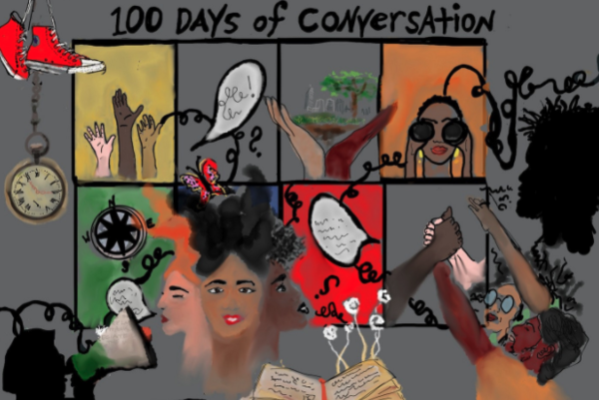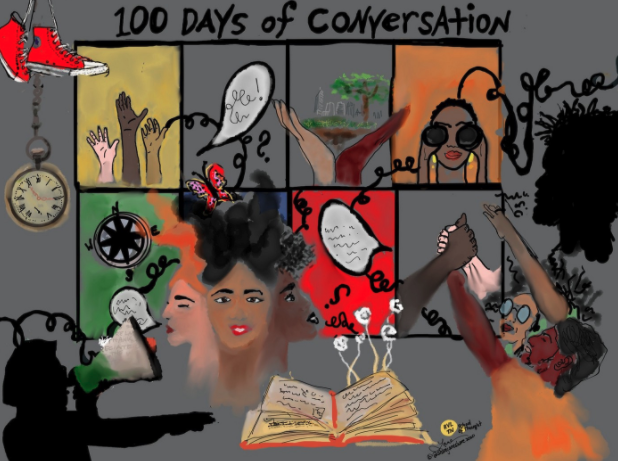Why Schools Need to Change
Want to Build a More Equitable Future? Listen to Students.
Topics

Today’s learners face an uncertain present and a rapidly changing future that demand far different skills and knowledge than were needed in the 20th century. We also know so much more about enabling deep, powerful learning than we ever did before. Our collective future depends on how well young people prepare for the challenges and opportunities of 21st-century life.
100 Days of Conversations About School levels the power dynamic between students, families, educators, and community members. Start a conversation today.
Youth Are Causing Change across the United States.

Léa Henaux (Social Media Team):
One million students from 125 different countries gathered on March 15, 2019, for a global climate strike. All were united by the common goal of making change and saving the planet. One million students skipped a day of school and set aside their education in the hopes of making enough noise to finally be listened to. It is scary and confusing to think that it took shoving school aside completely for youth voices to be heard, and it highlights one of the major shortcomings of our educational system; students simply aren’t listened to. Of course, this varies from school to school, but sadly the consensus among students seems to be that change happens outside of the classroom.
Perhaps the problem stems from the misconception that students don’t care about these things. And yet, this has been proven wrong several times, most significantly through the use of social media. Movements on gun laws, BLM, voting rights, and recently, against AAPI hate have all spread worldwide, in most part due to the activist efforts of the youth. Social media is a powerful medium for communication and has enabled the mobilization of a generation. However, it doesn’t always offer a platform for intergenerational conversations and still doesn’t provide a “seat at the table.” Open conversations between communities, students, and policymakers allow for the exchange of ideas, criticism, and support and, most importantly, provide opportunities for change.
Young people have a lot to say and a lot to learn. Therefore schools should play a role in raising student voices by facilitating conversations across generations, pushing students to think about the communities and problems that surround them, and giving them the tools to express themselves to the public. In difficult times like these, we could definitely use fresh and exciting youthful perspectives to build a more equitable future.
To Change the Education System, We Must Collect and Act on Student Voices.

Chris McNutt (100 Days Organizer):
Education reform has been tried for decades without much success. Despite A Nation at Risk, No Child Left Behind, and Race to the Top, U.S. students continue to struggle on standardized tests. And, sadly not as important to test-based reformers, 80 percent of young people are reporting significant depressive symptoms, less than half of students feel their learning is relevant, students are less and less engaged, and the Bulletin of Atomic Scientists state our world is now “100 seconds from doomsday.” All this despite decades of work by think tanks, researchers, policy experts, and the like to improve education by changing accountability metrics, issuing top-down changes, and retraining educators in ever-changing professional development.
The COVID-19 pandemic has exacerbated all of these problems, and I fear our new narrative of “learning loss” will repeat the cycle: reformers will cry out that students “aren’t learning,” they need remedial support, and new measures will be integrated that harm student well-being. Congress recently passed aid to K-12 schools to address “learning loss,” with a suggestion that mandatory summer school be implemented to lessen the “gap.” This, of course, ignores the experiences that young people have had during this life-changing pandemic and the learning that was achieved: taking care of loved ones, learning to cook, navigating the online classroom, time-management skills, coping with solitude, and much, much more. And, it believes the faux assumption that more time in a summer classroom will equate to academic success. The fact of the matter is—we have no idea! Instead, this is a bureaucratic solution: it looks simple on paper. If students go to school, they’ll learn more, even if it takes away from their free time.
However, missing from this entire conversation are the most important group—young people! When school leaders meet to discuss reimagining school post-pandemic, they mostly leave out the voices who will actually experience these changes. How can we incorporate meaningful change if the voices of young people aren’t at the table?
- Do students want to be in mandatory summer school?
- Are young people worried about “learning loss”?
- What are students' thoughts about standardized tests? How about the curriculum?
- What suggestions do young people have about the future of schooling?
The natural inclination of policy makers, I believe, is to inherently not trust student opinions. After all, young people just want to play video games! There’s a consistent narrative that youth are apathetic husks that only want to have fun and blow off school (despite overwhelming evidence that youth lead social change and are staunch advocates for changing up classrooms.) When we don’t listen to the primary advocates of the classroom: students (and teachers!) and blindly create reform measures...we’ll never see any meaningful reimagining of the schooling process. Listening to the people who will experience the blunt impact of your changes should be the number one priority for success.
When we create a system that listens to students, we in-turn build a system that creates democratic, critical thinkers. When we hold the sole right-answer, dictate top-down mandates, and act as the only expert in the room, we form a system that mirrors authoritarianism. Henry Giroux wrote in Ideology, Culture, and the Process of Schooling about positivist pedagogy, the top-down, test-based notion of education,
For many students, the categories that shape their learning experience and mediate their relationship between the school and the larger society have little to do with the value of critical thinking and social commitment. In this case, the objectification of knowledge is paralleled by the objectification of the students themselves. There is little in the positivist pedagogical model that encourages students to generate their own meanings, to capitalize on their own cultural capital, or to participate in evaluating their own classroom experiences. The principles of order, control, and certainty in positivist pedagogy appear inherently opposed to such an approach.
The act of listening to students is a powerful process because we’re teaching students by listening to them. The act of listening is, in and of itself, a valuable learning experience. By changing underlying systems to those that center student voices, we encourage students to take ownership of their learning, take risks on creating change, speak up against authority figures, come to collective consensus, and build their own outcomes. This, in conjunction with voices of the community, educators, and policymakers, is key to developing classroom settings that make sense for everyone involved.

Courtesy of Jane Shore @shorejaneshore of Revolution School
How do we hold these conversations at a broader level? That’s the goal of 100 Days of Conversations About School, a joint effort between Choice Filled Lives Network, Human Restoration Project, Local Voices Network, and REENVISIONED. 100 Days is catalyzing conversations across the country to level the power dynamic between students, families, educators, and community members. In this powerful experience, a small group of these constituents engages on a series of community- and education-based questions, at length, to learn from one another. Then, these conversations are synthesized into policy and practice recommendations for governments and nonprofit organizations.
As we hopefully near the end of the COVID-19 crisis, we need these connections now more than ever. To date, 97 percent of participants have said the 100 Days experience was “extremely” or “very” positive, and 92 percent felt more connected with their fellow participants following the conversation. Young people felt heard and respected in ways they hadn’t before.
Signing up is easy!
- Sign up to be a host (we’re running conversations until the end of April 2021!)
- Choose an adult and some young people (~3-8 people total) and schedule a conversation. A Zoom link will be sent that automatically records the conversation.
- Show up with the facilitation protocol, which can be read verbatim.
And, for more information, including example invites, thank you notes, and more, see our full hosting guide.
Following the conversation, all participants receive a transcript of the conversation sorted by key themes. This enables democratized meaning-making, as everyone can highlight, share out, and utilize key moments to showcase a need for change.
So far, over 200 individuals and organizations across all 50 states have signed up—and we’re looking forward to gathering as many conversations as possible to strengthen our results. Consider signing up to have your voice (and young people’s voices!) heard.
This Initiative Starts a Conversation that Makes a Substantial Change.

Olivia Chiang (Social Media Team):
School is an institute for learning life-long communication skills and career subjects such as chemistry, math, and English. Strong students are the goal of every school, yet the education community continues to pass up the perspectives of people within the system—the student voices! Students are in the education system, a perspective that no teacher, policy maker, or parent can fully understand. However, 100 Days of Conversations creates an opportunity for students to express what works in school and what educators and school systems can improve to foster a better learning environment.
Schools also pride themselves on teaching students communication and community-building skills. However, education has not been changing in accordance with student opinions and student feedback is, many times, ignored. How do students learn problem solving or active-listening skills when they are left out on important conversations such as those about their own education? In treating students as respectable intellectuals, the education community can allow students to participate in the bigger picture—and create change!




